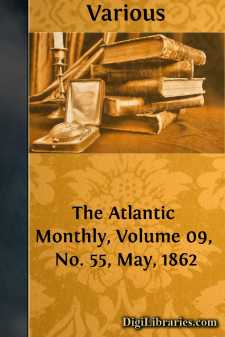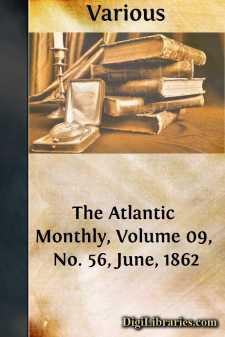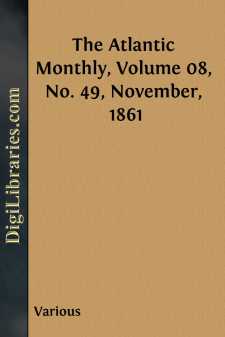Periodicals
- Art 27
- Children's periodicals 59
- Entertainment 5
- Food/Wine 2
- Games/Humor 455
- General 661
- Health 1
- History 53
- House/Home 1
- Regional 62
- Science/Nature 118
- Transportation 10
Periodicals Books
Sort by:
by:
Various
SOME SOLDIER-POETRY. It is certain that since the time of Homer the deeds and circumstances of war have not been felicitously sung. If any ideas have been the subject of the strife, they seldom appear to advantage in the poems which chronicle it, or in the verses devoted to the praise of heroes. Remove the "Iliad," the "Nibelungenlied," some English, Spanish, and Northern ballads, two...
more...
by:
Various
MAN UNDER SEALED ORDERS. A vessel of war leaves its port, but no one on board knows for what object, nor whither it is bound. It is a secret Government expedition. As it sets out, a number of documents, carefully sealed, are put in charge of the commander, in which all his instructions are contained. When far away from his sovereign, these are to be the authority which he must obey; as he sails on in...
more...
by:
Various
LETTER TO A YOUNG CONTRIBUTOR. My dear young gentleman or young lady,—for many are the Cecil Dreemes of literature who superscribe their offered manuscripts with very masculine names in very feminine handwriting,—it seems wrong not to meet your accumulated and urgent epistles with one comprehensive reply, thus condensing many private letters into a printed one. And so large a proportion of...
more...
by:
Various
THE FRUITS OF FREE LABOR IN THE SMALLER ISLANDS OF THE BRITISH WEST INDIES. The emancipation of an enslaved race seems, at first thought, a most uncertain and perilous undertaking. To do away with inherited and constantly strengthening tendencies toward irresponsibility and idleness,—to substitute the pleasure of activity or the distant good from industry for the very palpable influence of...
more...
by:
Various
WALKING. I wish to speak a word for Nature, for absolute freedom and wildness, as contrasted with a freedom and culture merely civil,—to regard man as an inhabitant, or a part and parcel of Nature, rather than a member of society. I wish to make an extreme statement, if so I may make an emphatic one, for there are enough champions of civilization: the minister, and the school-committee, and every one...
more...
by:
Various
I. It is my intention, in this series of papers, to give the history of the progress in Natural History from the beginning,—to show how men first approached Nature,—how the facts of Natural History have been accumulated, and how those facts have been converted into science. In so doing, I shall present the methods employed in Natural History on a wider scale and with broader generalizations than if...
more...
by:
Various
CHAPTER XX FLORENCE AND HER PROPHET It was drawing towards evening, as two travellers, approaching Florence from the south, checked their course on the summit of one of the circle of hills which command a view of the city, and seemed to look down upon it with admiration. One of these was our old friend Father Antonio, and the other the Cavalier. The former was mounted on an ambling mule, whose easy...
more...
by:
Various
GEORGE SAND. "Deduci superbo Non humilis mulier triumpho." These words are applied by Horace to the great Cleopatra, whose heroic end he celebrates, even while exulting in her overthrow. We apply them to another woman of royal soul, who, capitulating with the world of her contemporaries, does not allow them the ignoble triumph of plundering the secrets of her life. They have long...
more...
by:
Various
THE HOME OF LAFAYETTE. After General Lafayette's visit to the United States, in 1824, every American who went to France went with a firm conviction that he had a right to take as much as he chose of the old gentleman's time and hospitality, at his own estimate of their value. Fortunately, the number of travellers was not great in those days, although a week seldom passed without bringing two...
more...
by:
Various
NEAR OXFORD. On a fine morning in September, we set out on an excursion to Blenheim,—the sculptor and myself being seated on the box of our four-horse carriage, two more of the party in the dicky, and the others less agreeably accommodated inside. We had no coachman, but two postilions in short scarlet jackets and leather breeches with top-boots, each astride of a horse; so that, all the way along,...
more...











